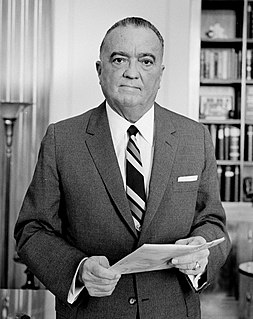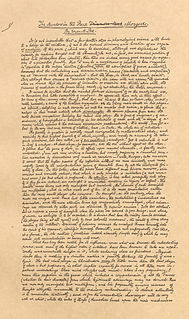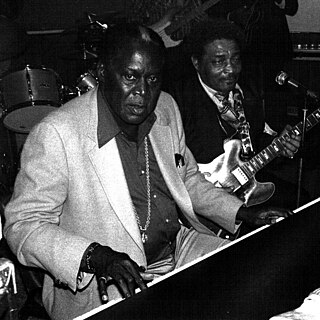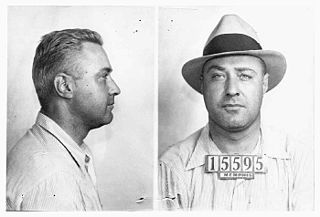Related Research Articles
Blues is a music genre and musical form which originated in the Deep South of the United States around the 1860s. Blues incorporated spirituals,work songs, field hollers, shouts, spirituals, chants, and rhymed simple narrative ballads from the African-American culture. The blues form is ubiquitous in jazz, rhythm and blues, and rock and roll, and is characterized by the call-and-response pattern of which the twelve-bar blues is the most common. Blue notes, usually thirds, fifths or sevenths flattened in pitch, are also an essential part of the sound. Blues shuffles or walking bass reinforce the trance-like rhythm and form a repetitive effect known as the groove.

Edgar Allan Poe was an American writer, poet, editor, and literary critic. Poe is best known for his poetry and short stories, particularly his tales of mystery and the macabre. He is widely regarded as a central figure of Romanticism in the United States, and of American literature. Poe was one of the country's earliest practitioners of the short story, and considered to be the inventor of the detective fiction genre, as well as a significant contributor to the emerging genre of science fiction. Poe is the first well-known American writer to earn a living through writing alone, resulting in a financially difficult life and career.

John Edgar Hoover was an American law enforcement administrator who served as the first Director of the Federal Bureau of Investigation (FBI). He was appointed director of the Bureau of Investigation – the FBI's predecessor – in 1924 and was instrumental in founding the FBI in 1935, where he remained director for another 37 years until his death in 1972. Hoover built the FBI into a larger crime-fighting agency than it was at its inception and instituted a number of modernizations to police technology, such as a centralized fingerprint file and forensic laboratories. Hoover also established and expanded a national blacklist, referred to as the FBI Index or Index List.

Science fiction is a genre of speculative fiction which typically deals with imaginative and futuristic concepts such as advanced science and technology, space exploration, time travel, parallel universes, extraterrestrial life, sentient artificial intelligence, cybernetics, certain forms of immortality, and the singularity. Science fiction predicted several existing inventions, such as the atomic bomb, robots, and borazon, whose names entirely match their fictional predecessors. In addition, science fiction might serve as an outlet to facilitate future scientific and technological innovations.

"The Balloon-Hoax" is the title used in collections and anthologies of a newspaper article by American writer Edgar Allan Poe, first published in 1844 in The Sun newspaper in New York. Originally presented as a true story, it detailed European Monck Mason's trip across the Atlantic Ocean in only three days in a gas balloon. It was later revealed as a hoax and the story was retracted two days later.

Memphis is a city in the U.S. state of Tennessee. It is the seat of Shelby County in the southwest part of the state; it is situated along the Mississippi River. With a population of 633,104 at the 2020 U.S. census, Memphis is the second-most populous city in Tennessee, after Nashville.

"The Murders in the Rue Morgue" is a short story by Edgar Allan Poe published in Graham's Magazine in 1841. It has been described as the first modern detective story; Poe referred to it as one of his "tales of ratiocination".

John Len Chatman, known professionally as Memphis Slim, was an American blues pianist, singer, and composer. He led a series of bands that, reflecting the popular appeal of jump blues, included saxophones, bass, drums, and piano. A song he first cut in 1947, "Every Day I Have the Blues", has become a blues standard, recorded by many other artists. He made over 500 recordings.

The Edgar Allan Poe Awards, popularly called the Edgars, are presented every year by the Mystery Writers of America, based in New York City. Named after American writer Edgar Allan Poe (1809–1849), a pioneer in the genre, the awards honor the best in mystery fiction, non-fiction, television, film, and theater published or produced in the previous year.

Le ChevalierC. Auguste Dupin[oɡyst dypɛ̃] is a fictional character created by Edgar Allan Poe. Dupin made his first appearance in Poe's 1841 short story "The Murders in the Rue Morgue", widely considered the first detective fiction story. He reappears in "The Mystery of Marie Rogêt" (1842) and "The Purloined Letter" (1844).

Walter Horton, known as Big Walter (Horton) or Walter 'Shakey' Horton, was an American blues harmonica player. A quiet, unassuming, shy man, he is remembered as one of the premier harmonica players in the history of blues. Willie Dixon once called Horton 'the best harmonica player I ever heard'.

George Kelly Barnes, better known by his pseudonym "Machine Gun Kelly", was an American gangster from Memphis, Tennessee, active during the Prohibition era. His nickname came from his favorite weapon, a Thompson submachine gun. He is best known for the kidnapping of oil tycoon and businessman Charles F. Urschel in July 1933, from which he and his gang collected a $200,000 ransom. Urschel had collected and left considerable evidence that assisted the subsequent FBI investigation, which eventually led to Kelly's arrest in Memphis, Tennessee, on September 26, 1933. His crimes also included bootlegging and armed robbery.

Eureka (1848) is a lengthy non-fiction work by American author Edgar Allan Poe (1809–1849) which he subtitled "A Prose Poem", though it has also been subtitled as "An Essay on the Material and Spiritual Universe". Adapted from a lecture he had presented, Eureka describes Poe's intuitive conception of the nature of the universe with no antecedent scientific work done to reach his conclusions. He also discusses man's relationship with God, whom he compares to an author. It is dedicated to the German naturalist and explorer Alexander von Humboldt (1769–1859).

Christopher Scott Thile is an American mandolinist, singer, songwriter, composer, and radio personality, best known for his work in the progressive acoustic trio Nickel Creek and the acoustic folk and progressive bluegrass quintet Punch Brothers. He is a 2012 MacArthur Fellow. In October 2016, he became the host of the radio variety show A Prairie Home Companion, which in December 2017 was renamed Live from Here.
A fix-up is a novel created from several short fiction stories that may or may not have been initially related or previously published. The stories may be edited for consistency, and sometimes new connecting material, such as a frame story or other interstitial narration, is written for the new work. The term was coined by the science fiction writer A. E. van Vogt, who published several fix-ups of his own, including The Voyage of the Space Beagle, but the practice exists outside of science fiction. The use of the term in science fiction criticism was popularised by the first (1979) edition of The Encyclopedia of Science Fiction, edited by Peter Nicholls, which credited van Vogt with the creation of the term. The name “fix-up” comes from the changes that the author needs to make in the original texts, to make them fit together as though they were a novel. Foreshadowing of events from the later stories may be jammed into an early chapter of the fix-up, and character development may be interleaved throughout the book. Contradictions and inconsistencies between episodes are usually worked out.
John Dunning is an American writer of non-fiction and detective fiction. He is known for his reference books on old-time radio and his series of mysteries featuring Denver bookseller and ex-policeman Cliff Janeway.
David Guy Compton is a British author who writes science fiction under the name D. G. Compton. He used the name Guy Compton for his earlier crime novels and the pseudonym Frances Lynch for his Gothic novels. He has also written short stories, radio plays, and a non-fiction book on stammering, its causes and cures.

Kenneth Martin Edwards is a British crime novelist, whose work has won awards in the UK and the United States. As a crime fiction critic and historian, and also in his career as a solicitor, he has written non-fiction books and many articles. He is the current President of the Detection Club and in 2020 was awarded the Crime Writers' Association's Diamond Dagger, the highest honour in British crime writing, in recognition of the "sustained excellence" of his work in the genre.

The works of American author Edgar Allan Poe include many poems, short stories, and one novel. His fiction spans multiple genres, including horror fiction, adventure, science fiction, and detective fiction, a genre he is credited with inventing. These works are generally considered part of the Dark romanticism movement, a literary reaction to Transcendentalism. Poe's writing reflects his literary theories: he disagreed with didacticism and allegory. Meaning in literature, he said in his criticism, should be an undercurrent just beneath the surface; works whose meanings are too obvious cease to be art. Poe pursued originality in his works, and disliked proverbs. He often included elements of popular pseudosciences such as phrenology and physiognomy. His most recurring themes deal with questions of death, including its physical signs, the effects of decomposition, concerns of premature burial, the reanimation of the dead, and mourning. Though known as a masterly practitioner of Gothic fiction, Poe did not invent the genre; he was following a long-standing popular tradition.
References
- ↑ "LC|n 95022543". viaf.org. Archived from the original on July 23, 2022. Retrieved July 23, 2022.
- ↑ "Meyer, G. J. 1940- [WorldCat.org]". www.worldcat.org. Archived from the original on July 23, 2022. Retrieved July 23, 2022.
- ↑ "Meyer, G.J. 1940- (Gerald Meyer) | Encyclopedia.com". www.encyclopedia.com. Archived from the original on November 13, 2021. Retrieved October 8, 2020.
- ↑ "Misery and misrule in long-ago England". March 29, 2011. Archived from the original on July 23, 2022. Retrieved July 23, 2022.
- ↑ "G.J. Meyer". Los Angeles Review of Books. Archived from the original on January 7, 2022. Retrieved July 23, 2022.